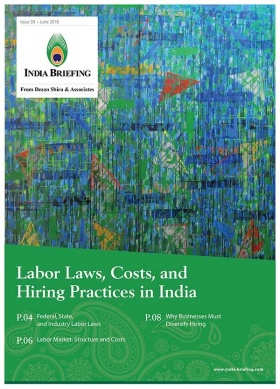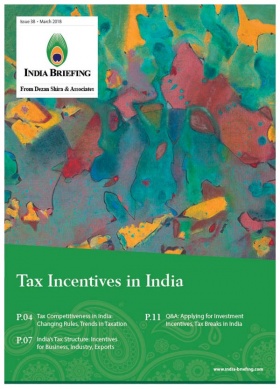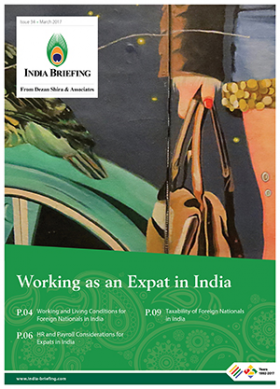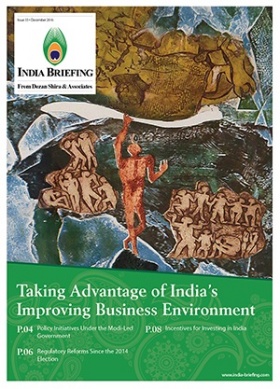Brand ‘Ayurveda’ in India’s FMCG Market: Matching Consumer Preferences for Natural, Organic Products
The US$53 billion fast-moving consumer goods (FMCG) sector in India is moving towards the wider adoption of Ayurveda – a branch of traditional Indian medicine.
Ayurveda involves the use of medicinal herbs and natural ingredients in the treatment of several ailments.
In recent years, its popularity has dramatically risen due to expanding application in personal care and food products segments, catering to the growing preference for organic ingredients.
The endorsement of several high profile spiritual leaders (gurus) has also contributed to this resurgent interest in Ayurveda-based products, catapulting new brands like the Baba Ramdev-promoted Patanjali to the top.
Here we discuss how top FMCG firms in India have had to respond to the ‘new age’ marketing by spiritual figureheads and their promotion of Ayurveda.
Natural products market in India
Previously, Ayurveda-based products in the Indian market were restricted to hair oils, the local dietary supplement called chyawanprash, and over-the-counter palliatives.
Now, natural Ayurvedic ingredients are increasingly being integrated into a growing number of products, ranging from shampoos, skincare creams, oils, and powders, toothpaste gels, and soaps to cough syrups, teas, packaged juices, and nutritional supplements, among other fast-moving consumer goods.
These products find massive appeal among, both, India’s millennials in urban and rural markets as well as among older consumers already familiar with the traditional herbal ingredients.
According to industry estimates, India’s natural products segment comprised of 41 percent of the personal care products market in 2017, contributing to US$2.5 billion worth of revenue; tier 2 and 3 cities grew the fastest at nine percent followed by eight percent growth in value in major metro cities.
South India and the states of Maharashtra, Madhya Pradesh, and Punjab lead national growth in the natural products segment; industry watchers estimate that future growth will be led by Delhi, West Bengal, and Uttar Pradesh.
The biggest distribution channel are chemist shops, which led to 19.4 percent value growth for the segment in FY 2016-17.
By 2022, India expects the market for Ayurvedic products to rise threefold to US$8 billion.
In terms of their FMCG market share in India, Hindustan Unilever Limited (HUL), the wholly-owned Indian subsidiary of British-Dutch conglomerate Unilever, is the top player followed by ITC Limited (India Tobacco Company Limited), and Patanjali Ayurved Limited.
HUL recently launched natural versions for shampoo brands Tresemme and Clinic Plus and for fairness face cream Fair & Lovely, as well as the naturals brand Lever Ayush.
Patanjali, Sri Sri Tattva bring new retail strategies to FMCG market
The wider application of Ayurvedic practices began more than a decade ago with the emergence of a new player in the FMCG market – Patanjali Ayurved Limited.
Founded in 2006 by Baba Ramdev, a self-styled yoga guru, Patanjali is an Indian FMCG company focused primarily on the personal care, cosmetics, and packaged foods segments.
Patanjali’s fortunes have jumped in the last six years; revenues rapidly grew from US$65 million in 2012 to over US$727 million in 2016 to US$1.57 billion in 2017. The company is looking at global expansion in the next five to 10 years.
Advertised as natural and organic, Patanjali products are also branded as ‘swadeshi’ or national, owing to their being Made-in-India. The company has also leveraged the mass popularity of its founder, Baba Ramdev, as a yoga teacher and spiritual god man – to effectively be its brand ambassador.
Patanjali says it has never carried any external market research, and advertising and operational costs comprised barely 6 and 2.5 percent of the company’s total revenue, respectively, in 2016. These costs are far lower than the average spending of most of its consumer goods rivals.
Patanjali’s brand of toothpaste, soap, hair oil, and shampoo – all branded Ayurvedic – are among its most popular products. Non-Ayurvedic products like honey and ghee (clarified butter) are also very popular, by association.
Patanjali does not directly own retail stores; instead, Patanjali products are sold in stores owned by independent entrepreneurs or small business groups. Its retail chain also does not include wholesalers. Currently, there are over 10,000 Patanjali stores across India.
A representative of a potential Patanjali franchisee undergoes training in Ayurveda. The presence of these practitioners allows stores to use the Patanjali brand name, while providing free medical advice, based on Ayurvedic teachings, to customers.
In fact, services provided by Ayurvedic practitioners at Patanjali stores act as a substitute for expensive ad campaigns, with the emphasis being on personalized networking.
Further, the popularity of the Patanjali brand compels local grocers and department stores to stock up on its goods.
Patanjali has now tied up e-commerce retailers Amazon, BigBasket, Flipkart, Grofers, and Paytm Mall to sell its products online.
Capitalizing on the success of Patanjali’s Ayurveda branding, Sri Sri Ravi Shankar, the spiritual leader of the Art of Living movement in India, launched his own FMCG brand – Sri Sri Tattva – in 2017.
Sri Sri Tattva intends to expand its value chain by producing its own natural ingredients for its line of personal care and food products.
Unlike the mass appeal of Patanjali, products by Sri Sri Tattva cater to a niche market of urban middle-class consumers. According to its founder, the company aims to open 1,000 stores by the end of 2018 and generate revenues worth Rs 5 billion (US$73.53 million).
The proposed stores work on a franchisee model in association with Franchise India and will have three types of stores – Sri Sri Tattva Mart (retailing packaged food, personal, and home care products); Sri Sri Tattva Wellness Place (access to healthcare practitioners and health and wellness services); and Sri Sri Tattva Home and Health (retailing daily use products, Ayurveda medicines and access to Ayurveda doctors).
Top FMCG firms invest in traditional focus
Patanjali faces stiff competition from established domestic rivals like Dabur, Godrej Consumer, Emami, Hamdard, ITC, Dr Vaidya’s, and the Himalaya Drug Company.
Its main foreign competitors are Colgate-Palmolive and Hindustan Unilever Limited (HUL).
Founded in the mid-1880s, Dabur India Ltd is one of India’s oldest companies manufacturing Ayurvedic remedies. Today it boasts of customers in 120 countries. Yet, until recently, Ayurveda wasn’t at the core of its marketing strategy despite being its initial focus.
That’s because since the 1990s, Dabur has embarked on diversifying its original business through the production of non-Ayurvedic products. As of 2016, sales of non-Ayurvedic products comprised 40 percent of the company’s total sales of US$1.2 billion.
However, with the rapid rise of Patanjali, the company has been forced to do a U-turn, compelling Dabur to rebuild its image as India’s first Ayurvedic company.
Dabur is also expanding its total area of land under cultivation from 2,000 acres to 4,500 acres to become India’s largest cultivator of rare medicinal herbs.
To counter Patanjali’s sales model, Dabur has eliminated outsourcing its rural sales to third-party vendors by hiring rural sales representatives directly on its payroll.
HUL, on the other hand, has responded by increasing its footprint in the natural products market through the purchase of Indulekha, an Indian brand of Ayurvedic personal care products, for US$48 million in 2015.
Colgate-Palmolive, the leader in the Indian oral care segment, recently introduced several products containing herbal ingredients after losing considerable market share to Patanjali.
Federal support and regulatory compliance
India’s federal Ministry of AYUSH (Ayurveda, Yoga & Naturopathy, Unani, Siddha, and Homeopathy) has actively promoted the development of the Indian natural products segment through awareness campaigns.
AYUSH was upgraded from a small department under the Ministry of Health and Family Welfare into an independent federal ministry after Prime Minister Narendra Modi’s Bharatiya Janata Party (BJP) formed the government in 2014.
The Ministry of AYUSH endorses traditional forms of Indian, Persian, and Tibetan medicine, which are popular among all Indians, as alternatives to modern allopathic drugs. AYUSH has also initiated publicity campaigns to popularize Ayurveda and yoga.
Annual celebrations like the International Day of Yoga on June 21 promote fitness as well as the adoption of a healthy lifestyle using natural and herbal products.
Modi’s government has also initiated changes to federal laws to broaden the spectrum of Ayurvedic products.
Amendments to the Drugs & Cosmetics Rule of 1945, which governs the personal care and cosmetics industry in India, recently accommodated new industry demands.
Among the changes introduced is an amendment that allows natural products, including Ayurvedic products, to contain preservatives, excipients, and flavoring agents.
Foreign firms should practice due diligence
Many Patanjali products still lack approval by the federal food safety regulator – Food Safety and Standards Authority of India (FSSAI). Yet, the massive price difference – up to 40 percent in some cases – sees customers opting for Patanjali despite its failure to secure food safety approvals.
Foreign firms, however, must be more diligent – prioritizing regulatory approvals and following best practices.
Moreover, these firms need to take caution when being subject to inspections by government officials.
Firms should consult the FSSAI’s food safety inspection checklists. The FSSAI assesses companies based on:
- Design and facilities;
- Control of operation;
- Maintenance and sanitation;
- Personal hygiene; and,
- Training and complaint handling.
The lack of enforcement of food safety standards for Patanjali’s foodstuffs contrasts the action taken against the Swiss multinational giant, Nestlé, in May 2015.
At the time, Nestlé was forced to recall and destroy 38,000 tons of its beloved ready-to-eat noodle, Maggi, after it was allegedly found to contain high concentrations of a harmful substance.
The resulting fallout cost the company an estimated US$277 million in sales alone, besides considerable damage to its longstanding reputation as a trusted brand.
While Nestlé went on to validate its safe consumption after being tested at the Agri Food and Veterinary Authority of Singapore (AVA), India refused to indulge, demanding due process. (Meanwhile, in mid-June 2015, Patanjali announced its plans to launch a locally sourced whole-wheat noodles product later in the year.)
The Nestlé debacle has since gone down in the FMCG industry as a case study for foreign companies doing business in India – from crisis management and public relations to the importance of regulatory inspections.
About Us
India Briefing is produced by Dezan Shira & Associates. The firm assists foreign investors throughout Asia and maintains offices in China, Hong Kong, Indonesia, Singapore, Vietnam, and Russia.
Please contact india@dezshira.com or visit our website at www.dezshira.com.
- Previous Article Significant Beneficial Ownership in Indian Companies to be Declared by September 11
- Next Article India’s Presumptive Taxation Scheme: SMEs and Professionals Key Beneficiaries














